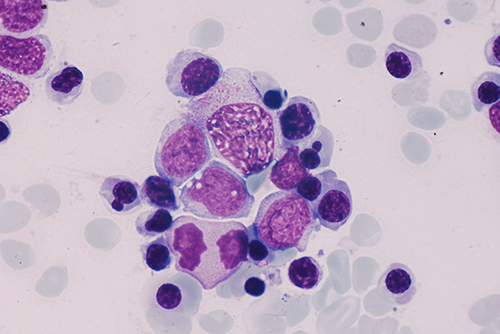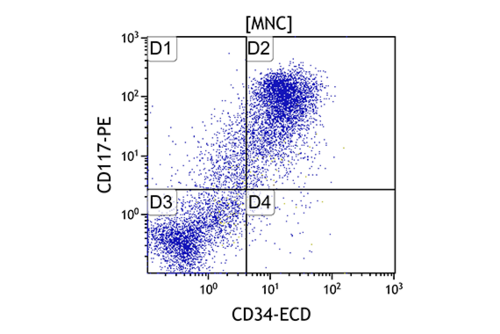- The University
- Studying
-
Research
- Profile
- Infrastructure
- Cooperations
- Services
-
Career
- Med Uni Graz as an Employer
- Educational Opportunities
- Work Environment
- Job openings
-
Health
-
Health Topics
- Health Infrastructure
-
Health Topics
Research team Zebisch
Research Unit: Signal transduction in myeloid malignancies
Research focus: Inflammation, autoimmunity and cancer - MYELOID LEUKEMIAS
PI: Armin Zebisch
Focus: Myeloid leukemias are devastating hematologic cancers with a dismal prognosis in affected patients. In the experimental-translational part of our work, we aim to delineate the molecular basis of myeloid leukemia development and use this knowledge to design novel treatment approaches. We are especially interested in the role of RAS-oncogenes, an essential component of many intracellular signal transduction cascades. They are potent drivers of leukemia development and frequently mutated in human myeloid leukemia patients. In an additional part of our work, we run a large leukemia biobank, where we collect and archive high-quality specimens of patients with myeloid leukemias. These samples are then used for our experimental-translational research and shared in national and international cooperations. Finally, we perform clinical trials on myeloid leukemias and aim to bridge preclinical knowledge into the development of novel treatment approaches.
Network: We are located at the Division of Hematology, the Division of Pharmacology, and the Center for Medical Research (ZMF) for the experimental-translational part of our research. This setting enables direct interaction with both basic and clinical scientists. Moreover, the team actively collaborates with renowned national and international experts. Our research covers the whole spectrum of preclinical and clinical leukemia research, including studies in genetically engineered leukemia mouse models and leukemic cell lines, where we perform cutting-edge techniques, such as CRISPR/Cas9 genome editing. Importantly, our research also provides a strong translational aspect as we extend our work to primary human leukemia patient specimens. Another focus of our group is leukemia biobanking, where we collect and archive high-quality patient specimens of myeloid leukemias. Therefore, we are closely connected to the Med Uni Graz Biobank. Finally, we perform clinical trials on myeloid leukemias at the Division of Hematology and benefit from the clinical trial infrastructure at this department. We are also collaborating with national and international partners from academic study groups and the pharmaceutical industry.
Projects
Experimental-translational project: The role of EZH2 mutations in RAS-mutated myeloid leukemias
- Mutations in RAS and EZH2 frequently co-occur in myeloid leukemias. We could show that EZH2 mutations potentiate the leukemogenic effects of RAS mutations, which ultimately alters the sensitivity to RAS-signaling inhibitors (Berg JL et al., Leukemia 2021). In this project, we employ transgenic mouse models to comprehensively characterize the co-existence of RAS and EZH2 mutations and elaborate on novel therapeutic approaches for this genetic condition. Finally, we validate the clinical relevance of the results in primary patient specimens and ‘patient-derived xenograft’ transplantation models.
- Duration: 2019-2025
- Funded by: Leukämiehilfe Steiermark
- Project partners (Med Uni Graz external): Klaus Geissler (Krankenhaus Hietzing, Wien), Michael Schuster & Thomas Penz (CeMM Research Center for Molecular Medicine of the Austrian Academy of Sciences, Wien); international: Carsten Müller-Tidow (Universitätsklinikum Heidelberg, Deutschland), Karen Blyth (The Beatson Institute, Glasgow, UK), Veronica Caraffini (University of Cambridge, Cambridge, UK)
Experimental-translational project: Novel therapeutic approaches in RAS-mutated chronic myelomonocytic leukemia (CMML)
- Chronic myelomonocytic leukemia (CMML) is an aggressive cancer of the hematopoietic system. Pathogenetically, it is frequently driven by mutations modifying the RAS oncogenes (RASmut). Unfortunately, current therapeutic approaches for RASmut CMML patients are insufficient. In the preliminary data of this project, we performed high-throughput drug screening and identified a novel molecular target in RASmut CMML. Pharmacological compounds targeting this gene are already available and tested in clinical trials for other cancer entities.
- In this project, we will follow up on these data and perform an extensive preclinical evaluation of this novel therapeutic approach. We will therefore use specific Rasmut mouse models of CMML, where we test for the efficacy and toxicity of these compounds. To strengthen the translational aspect, we will further validate these data in ex-vivo experiments using primary RASmut CMML patient specimens. Finally, we will transplant human RASmut CMML samples into immunocompromised mice and use these models as an additional treatment validation phase.
- In conclusion, the data generated in this project will preclinically test a novel therapeutic approach in RASmut CMML. Besides testing its feasibility, efficacy, and toxicities, the project will also aim to elaborate on the mechanisms behind this pharmacological strategy. Ultimately, we will use the data generated within this project to pave the way to the initiation of clinical trials in RASmut CMML.
- Duration: 2023-2026
- Funded by: Austrian Science Fund (FWF)
- Project partners (Med Uni Graz external): Philipp Staber (Medical University of Vienna, Austria), Tea Pemovska (Medical University of Vienna, Austria), Karen Blyth (Beatson Institute for Cancer Research in Glasgow, UK)
Experimental-translational project: Deciphering the pathogenesis of myeloid sarcoma
- Acute myeloid leukemia (AML) is a systemic disease of the hematopoietic tissues. In some cases, leukemic cells infiltrate extramedullary tissues and grow as solid tumors, a situation referred to as ‘myeloid sarcoma’. We previously demonstrated that aberrant RAS-signaling contributes to the development of this specific AML subtype (Caraffini V et al., Blood 2018). In this project, we aim to further elaborate on the molecular pathogenesis of myeloid sarcoma and lay a specific focus on RAS-signaling aberrations.
- Duration: 2023-2026
- Funded by: Transcan-3 ERA-NET
- Project partners (Med Uni Graz external): Luca Vago (IRCCS Ospedale san Raffaele, Milano, Italy ), Robert Zeiser (Medical Center - University of Freiburg, Freiburg, Germany), Enrico Derenzini (IEO Istituto Europeo di Oncologia IRCCS, Milan, Italy), Friedrich Stölzel (Universitätsklinikum Dresden, Dresden, Deutschland), Carolina Florian (IDIBELL, Barcelona, Spain)
Biobanking of myeloid leukemias
- We collect and archive high-quality specimens of myeloid neoplasias (MN) with a specific focus on acute myeloid leukemia (AML), chronic myelomonocytic leukemia (CMML), and myeloproliferative neoplasms (MPN). Specimens are derived from either bone marrow or peripheral blood, enriched for mononuclear cells, and stored in DMSO in liquid nitrogen, thus enabling various analytical and functional experiments, including patient-derived xenografts. Specimens are usually obtained at diagnosis, remission or refractory disease, and relapse. Clinical and genetic/NGS data and information about therapeutic regimens administered are available for each sample. Also, see https://biobank.medunigraz.at/.
- Duration: Permanent project
- Funded by: Med Uni Graz, Leukämiehilfe Steiermark
Clinical trials in myeloid leukemias
- Clinical trials are an essential part of the development of novel therapeutic approaches. Our research group is a partner from academic study groups, including the German-Austrian AMLSG (Acute Myeloid Leukemia Study Group) and the AGMT (Austrian Group Medical Tumor Therapy). Moreover, we are collaborating with the pharmaceutical industry. Finally, we perform real-world data analyses in myeloid leukemia registries. Also, see https://haematologie.medunigraz.at/en/research/klinische-forschung.
- Duration: Permanent project
- Funded by: AMLSG, AGMT, Pharmaceutical Industry, Med Uni Graz





